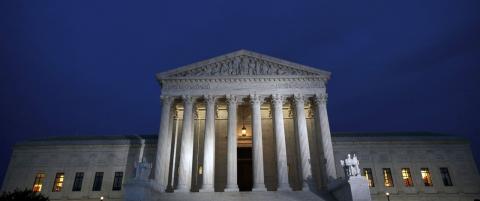Share
Setting the Record Straight: The Supreme Court and the Immigration Ban

Conservatives and Trump were rejoicing on Monday, June 26, 2017 and claiming a victory on the U.S. Supreme Court's opinion issued that day. The Supreme Court granted certiorari in cases appealed from the Fourth Circuit Court of Appeals and the Ninth Circuit Court of Appeals, and granted a stay of certain parts of the preliminary injunctions that stopped Trump's immigration ban from going into effect. If you don't know exactly what the previous sentence means, you are not alone. Let's break down what the Supreme Court "opinion" means.
First, what does it mean that a court granted certiorari? It means that a higher court, in this case the U.S. Supreme Court, has agreed to consider the ruling of a lower court. So this is just a procedural mechanism by which the Supreme Court is saying: "Ok, we'll take a look at the issues in the cases that were in the Fourth and Ninth Circuit Courts of Appeal and let you know if we think those courts were right or wrong."
Next, what is a stay? Put simply, it stops something from happening.
Finally, what is a preliminary injunction? This is a mechanism by which a court can order that an action should not occur even before that court decides if the argument backing up the preliminary injunction is valid. It is not meant to permanently stop something from happening; instead, it is in effect until the court rules on the substance of the lawsuit and decides what should happen permanently.
As the Supreme Court writes on page 9 in the opinion, the point of this kind of injunction "is not to conclusively determine the rights of the parties ... but to balance the equities as the litigation moves forward."
Ok, so what does this all mean? Two things.
First, the Supreme Court decided that it is going to hear arguments about Trump's "travel" ban.
Second, it decided that the Courts of Appeals went a little overboard in how they stopped enforcement of the travel ban on a preliminary basis, so, the Supreme Court narrowed it. The travel ban can now go into effect for people who have no ties to the United States and are from Iran, Libya, Somalia, Sudan, Syria, and Yemen. The travel ban cannot go into effect for people from those countries who have a relationship to some American person or entity.
Simple, right? But it gets even trickier. The part of the travel ban that the Supreme Court said could now go into effect for people with no ties to the U.S. was originally limited to a period of 90 days after the effective date of Trump's second travel ban for people from those countries generally, and 120 days after for refugees. That effective date was March 16, 2017, meaning that the 90-day period ended before the Supreme Court issued its opinion June 26, 2017, but the 120-day period is still running. The Supreme Court also let the parties know in its opinion that it wants to know if the 90-day travel ban on people generally is even relevant anymore or "[w]hether the challenges to [that part of the travel ban] became moot on June 14, 2017."
So is the travel ban in effect now or not for those people without ties to the U.S.? According to the New York Times, it will go into effect at 8 p.m. Eastern tonight, Thursday, June 29, 2017, meaning that people without these ties will no longer be allowed into the U.S. But not all family members of someone in the United States are considered to have sufficient ties. The Trump administration defined the types of close family relationships to a person that will be needed to be allowed into the United States from the six countries:
"According to a diplomatic cable obtained by The New York Times, “close family” is “defined as a parent (including parent-in-law), spouse, child, adult son or daughter, son-in-law, daughter-in-law, sibling, whether whole or half. This includes step relationships.”
But it went on to state that “close family” does not include “grandparents, grandchildren, aunts, uncles, nieces, nephews, cousins, brothers-in-laws and sisters-in-law, fiancés and any other ‘extended’ family members.”"
Stay tuned for more news about if and how the travel ban is enforced, and the Supreme Court's ultimate ruling on Trump's travel ban. Remember, the Supreme Court has not yet addressed the substantive issues in the case. We are surely in for some fireworks.
Sources:
https://www.supremecourt.gov/o
